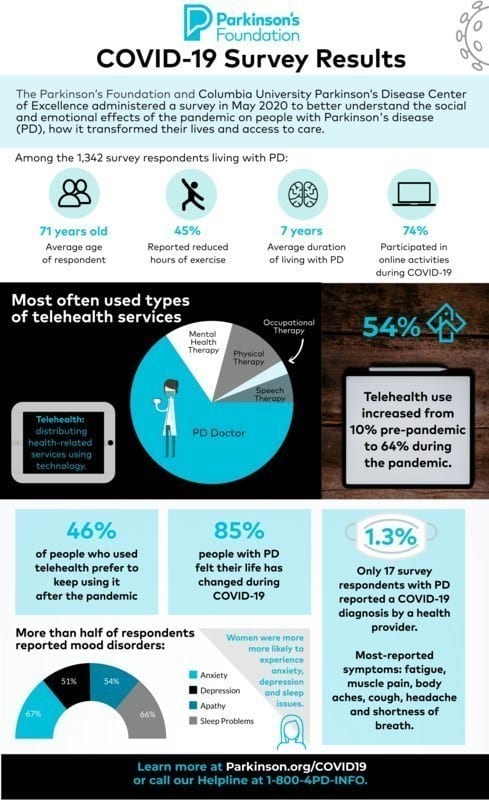The Parkinson’s Foundation announces the results of a survey measuring how people with Parkinson’s disease (PD) are coping during the COVID-19 pandemic. Complete results are available in npj Parkinson’s Disease.
The Parkinson’s Foundation administered the survey in collaboration with the Movement Disorders Division of the Department of Neurology at Columbia University Vagelos College of Physicians and Surgeons and the NewYork-Presbyterian/Columbia University Irving Medical Center. The goal is to provide guidance to clinicians, policy makers and the PD community on how COVID-19 has transformed the lives of people with Parkinson’s and their access to care.
“During these unprecedented times, this survey helps us better understand how we can support the PD community and meet their needs as the pandemic continues to impact their health and well-being. This survey further validates our mission to make life better for people with Parkinson’s disease and ensure they have access to the resources and information they need from the comfort and safety of their homes.”
— John L. Lehr, President and Chief Executive Officer of the Parkinson’s Foundation
Survey Results
The survey, distributed in May 2020, focused on the health status, emotional health, attitudes and practices related to changes in the routines of people with Parkinson’s disease since the pandemic started. Only 1.3% of respondents with PD reported a COVID-19 diagnosis by a health provider while 38.5% were greatly concerned that they would become infected and require intensive hospital care.
Similarly, 67% of respondents experienced nervousness or anxiety overall, 51% reported feeling down or depressed, and 66% reported sleep disturbances. Women were more likely to experience these symptoms than men, with the exception of experiencing a reduced interest or pleasure in doing things, a media release from the Parkinson’s Foundation explains.

Telehealth use among the respondents increased from 10% prior to the pandemic to 64% during the pandemic. Those with higher income and higher education were associated with greater telehealth use. People used telehealth most often for a doctor’s appointment compared to other health therapies (mental health, physical therapy, occupational therapy and speech and language pathology). Among those who had used telemedicine services, 46% preferred to continue using telehealth always or sometimes after the COVID-19 outbreak ends.
“There is little doubt that the stress from COVID-19 and the limitations of social distancing affect everyone negatively, including people with PD. The survey highlights PD-specific issues and potential coping mechanisms, including online social support and telemedicine to reduce the burden caused by the pandemic. The survey findings support that remote medical care can be very useful in these times and may be helpful to people with PD even after the resolution of the pandemic.”
— Roy Alcalay, MD, MS, the Alfred and Minnie Bressler Associate Professor of Neurology (in the Taub Institute) at Columbia University Vagelos College of Physicians and Surgeons and associate attending neurologist at NewYork-Presbyterian/Columbia University Irving Medical Center and survey lead
Data Suggests Disparities
The data from the survey strongly suggests disparities across socioeconomic status in people with PD during the COVID-19 pandemic, with those of lower income far more affected by financial and employment uncertainties. Factors such as location and local COVID-19 rates were not associated with mood symptoms. This suggests that communities deemed at lower risk of spread are not immune to the overwhelming influence of the COVID-19 pandemic on everyday life.
The Parkinson’s and COVID-19 survey, administered between May 2020 and June 2020, received 1,342 completed responses from people with PD. Respondents live across states that experienced all levels of COVID-19 infection. The average age for respondents was 71, and the average time they have lived with Parkinson’s was 7 years.
[Source(s): Parkinson’s Foundation, PR Newswire]
Related Content:
Parkinson’s Foundation Expands Its Virtual Programs to Ensure Access to Resources During Pandemic
Parkinson’s Genetic Testing Study Brings Surprising Results





